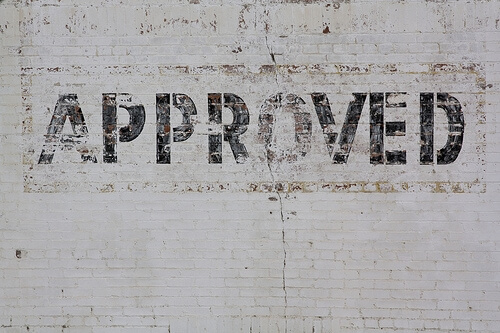Sign up to sign off
Client sign off. Seems straightforward enough doesn’t it? Do the work, get it signed-off, everyone’s happy.
Well yes and no. Although it sounds pretty straightforward, the whole subject of client sign-off can be a bit of a gray area.
So, if you provide a professional service, it’s a good idea to be aware of what client sign-off means, why it makes good business sense to get it and how you can ensure that you do.
Great, but where do you go to find out more? One of the easiest things would be to ask us. That’s what this guy did:
Professional: Hello InsuranceBee. What’s client sign-off all about?
InsuranceBee: Hmm, yes, good question. It can be a bit of hot potato so it’s certainly worth trying to help if we can.
Out of interest, what do you do?
Professional: I’m in marketing. Consultancy mainly but some design work too.
InsuranceBee: So you get your clients’ approval on any artwork you do?
Professional: Yep. Well I think so. I show it to them and they give me the thumbs-up. Is that what you mean?
InsuranceBee: Well that’s a start. The next thing would be to get that thumbs-up documented in some way. Getting your work signed-off by your client is one of the first steps to best practice.
Professional: How so?
InsuranceBee: Simple – let’s take your artwork as an example. It’s a well established precedent in law that your client accepts final responsibility for it by signing it off.
If they spot an error after they’ve put pen to paper and the artwork needs to be re-printed, in simple terms, it becomes their problem not yours.
That’s an important distinction.
Professional: But what if my client argues that my error is my error – regardless of whether they signed-off the work or not? And worse, what if they then decide to sue me for the cost of fixing it?
InsuranceBee: Well, first of all, by signing off, the client is stating that the work has been performed acceptably and that you have fulfilled your obligation. In typical cases, therefore, once you have sign-off you’re off the hook, legally and technically, at least, and so your policy probably won’t cover the cost of re-prints or other corrections.
Professional: And that’s because the artwork is no longer my responsibility, right?
InsuranceBee: Exactly.
Professional: Does that mean I’m not covered then?
InsuranceBee: No it doesn’t. If your client decides to sue, your PL insurance will still be there to defend you. That is what it’s for, after all.
In our example, it just won’t pay for the costs of a re-print that’s all.
Professional: I see. What if, despite my best efforts, something goes wrong after everything’s been signed off?
InsuranceBee: Like?
Professional: Well, what if I accidently send the wrong, unapproved version of the artwork to the printer? Or what if I inadvertently change part of a document while correcting an error and it’s not noticed until it’s too late?
InsuranceBee: Good examples and both are actually pretty common. Either way, as before, you’ll be covered.
Professional: That’s a relief. And what about the printer? What if they drop the ball?
InsuranceBee: If the printer makes a mistake then the printer fixes it. Simple as that.
Professional: I’m always making last-minute verbal amendments too though. How do I keep track of them?
InsuranceBee: Your best bet with these is to acknowledge the amendment in writing. Importantly, within that, you should also point out that if your client is unable to sign-off the final version then you’ll accept no responsibility for errors that subsequently occur.
Professional: That seems fair enough. So how do I go about making the whole sign-off process ‘official’?
InsuranceBee: It doesn’t have to be complicated. We’d recommend having a section in your Terms and Conditions that references your sign-off procedure and explains your clients’ responsibilities. That should be enough.
And then don’t forget to actually apply it, of course…
Professional: Of course. Just one more thing: I assume if I don’t get sign-off at all then I’m not covered?
InsuranceBee: You’d think so wouldn’t you? But no, that’s not the case.
If, for some reason, you didn’t get client sign-off and it turns out there was an error (and it was your fault), your policy would still defend you. You have made a genuine mistake after all.
Don’t assume that you can skip sign-off though. Sign-off and good insurance complement one and other. Neither is a substitute for the other.
Professional: I wouldn’t dream of it. I’ll get on it then. Thanks InsuranceBee.
InsuranceBee: No problem. InsuranceBee signing off…

